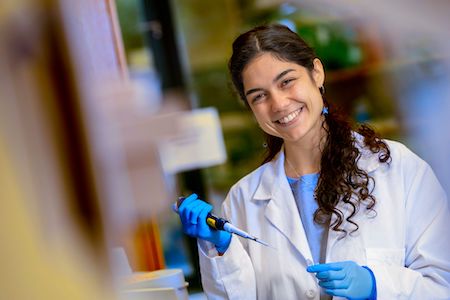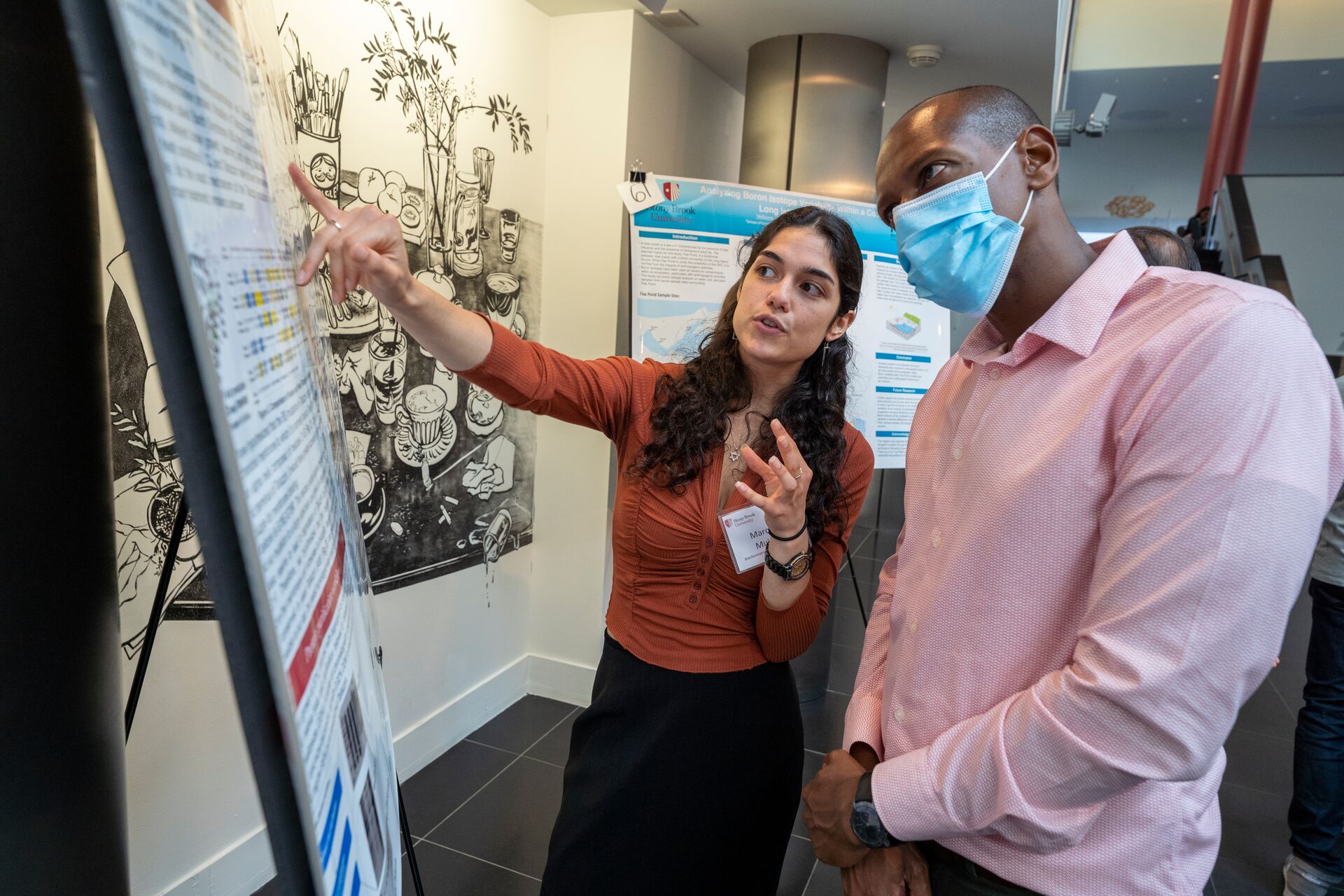Researcher of the Month
October 2022
 Marcela Muricy
Marcela Muricy
Major: Biology, Women's Gender & Sexuality Studies, Class of 2023
Research Mentor: Dr. Steven Glynn, Department of Biochemistry & Cell Biology
Marcela Muricy (class of 2023) is a strong advocate for immersive, summer research: “…Now I’m just so much more confident in what I’m doing. And if I have an idea, I can actually execute it. If I have a problem with one of my experiments, I know how to troubleshoot it. And it's just a completely different dynamic and I learned so much faster than I thought I was going to. “
A senior in the University Scholars honors program, Marcela is an aspiring physician
double majoring in Biology and Women’s Gender and Sexuality Studies. For the past
year, she has been doing research under the mentorship of Dr. Steven Glynn (Biochemistry
& Cell Biology) on a project to purify and characterize Tafazzin, an important mitochondrial
lipid metabolizing enzyme. Her research in the Glynn Lab to investigate how disease
mutations in Tafazzin impact membrane binding was supported this past summer through
UG Biology and URECA-funded programs; 
Previously, Marcela was selected as a Giuliano Global Fellow (Dec. 21-Jan. 22) and had the opportunity to conduct research in Rio de Janeiro, Brazil on the impact of a universal healthcare system (exploring class issues, quality of care, etc.). Since June 2021, Marcela has also been interning as a surgical assistant at the Bariatric Center of Excellence at RUMC. On campus, Marcela has been active as a Teaching Assistant for Biology & Chemistry (BIO 202, BIO 361, CHE 131); is a co-founder and Vice President of Speaking STEM SBU; and serves as a Treasurer and member of SBU Brooklogue, a Journal of the Humanities and Social Sciences.
Marcela is a graduate of Susan E. Wagner High School in Staten Island, and is a first-generation college student. Her hobbies include hiking, swimming, and reading. Below are excerpts of her interview with Karen Kernan, URECA Director.
*View videos featuring the Velay Fellows (Summer 2022)
The Interview:
Karen: Tell me about your current research.
Marcela: I’m in the Glynn lab, and we are investigating how disease mutations in Tafazzin impact membrane binding. There's a phospholipid called Cardiolipin that is predominantly in the mitochondrial membrane, and serves to create these inward folds that increase the membrane surface area. That detail is really important in terms of the energy production in the mitochondria. Cardiolipin is produced by a protein called Tafazzin that, when mutated, results in a disease called Barth syndrome that is characterized by Cardiolipin deficiency. So when you have less cardiolipin, you have a decreased surface area, and that leads to decreased energy production. …My project involves performing a variety of experiments to purify and characterize Tafazzin. The goal is to investigate the mechanisms of Tafazzin, its interactions with the membrane, and what mutations could be hindering its production of cardiolipin in Barth Syndrome.
How did you get first involved with research here at Stony Brook?
I took a class with Dr. Glynn in the summer of 2021: Biochemistry 361. And I just loved that class! It is probably my favorite class I’ve taken at Stony Brook because it was so rigorous and so challenging. I just loved it! I loved learning all the intricate details and how everything worked, and Dr. Glynn seemed like someone who’d be really interesting to work with because of his research interests and his passion for teaching. I emailed him and eventually got a position in his lab. That was in September 2021.
Did you have to learn a lot of new lab skills?
Yes, the work is very hands on and I had to learn everything from square one. I didn't have any previous lab experience when I first came in—in part due to the covid situation. Last fall, I was mentored initially by one of the grad students in the lab, but she left soon after that first semester. And for the most part now, the person who has really taught me how to do everything in the lab has been Dr. Glynn himself.
Was the summer research experience beneficial for you?
When I first joined the lab, I wasn't in the lab as much as I wanted to be — because of my classes and other commitments. There were always certain gaps in what I knew how to do; to get from point A to point E, someone had to do point C while I was in class. But the summer experience was what changed everything for me because I got to do everything in chronological order completely independently.
To be financially supported was a lifesaver, because I would have had to get a job and I wouldn’t have been able to have that five days-a-week training without the summer program. Now I’m just so much more confident in what I’m doing. And if I have an idea, I can actually execute it. If I have a problem with one of my experiments, I know how to troubleshoot it. It's just a completely different dynamic and I learned so much faster than I thought I was going to.
What would you say you learned from doing research that you don't learn from classes alone?
I’d say learning how to really think critically. Because when it comes to classes, you partly know what you're going to be tested on. You can always say, “Okay, I’m going to sit down and I’m going to really memorize these facts. And I’m going to execute that on the exam and prove what I know.” But when it comes to the lab, things go wrong. You can’t always anticipate what will happen. So that process just helps you gain so much more familiarity with what you're working with, and expand your knowledge of the research that you're working on because you have to constantly think about how to solve a problem. When you have something that you’re curious about, or you want to figure out how to go about getting to the solution, and learning to troubleshoot, you have to be the one that dictates what techniques can be used and in what order.
What do you enjoy most about doing research?
For one, the independence. I really like trying to figure out for myself what I have to do, especially when I get into the flow of things. Thinking critically, really learning a lot of details about this one specific topic, that’s something I like a lot. But perhaps one of my favorite things about research is the time I get to spend with other people in the lab. I’m a people person. So when I get to work with my PI or with other people in my lab, I think it's so much fun. You get to spin off ideas from each other and come up with new ideas that you never would have thought of by yourself. You get to think about things in a different way, or with a new perspective by talking to the grad students and the professor. So that's something that I really love. Having that connection with other people, that networking aspect of research—that’s an amazing part of being in a lab.
Yes, for people who are not as familiar with a lab environment, they may be surprised to know how much of a community it is.
One of the things I’ve really come to appreciate about my lab — I would say something that I didn't even know was so good at first— is the whole team aspect of working in the lab. My PI really wants us all to learn how to work independently. At the same time though, if I have a question, even if it's a stupid question, I know he’s there and won't judge me for it. And so that means there’s not as much pressure being put on any one person in the lab. My PI is someone who will always say, “Let’s figure this out together.” And that dynamic makes you operate like a team, when you know everyone is on a one to one level. It just makes you feel more comfortable in the lab and more willing to ask questions.
What advice would you give to other students about research?
Be sure to find something that you really like and are interested in. Because if you're not doing something that you are interested in, it's not going to work. There are certainly going to be those days in the lab when things can be going slowly or be challenging…it’s definitely a long game. But that aspect of independence, and the fact that what you're doing could potentially pay off, feels really good. So I’d recommend giving it a try.
I’m very grateful that I found the opportunity to do research with Dr. Glynn because I knew that what he was doing was something I was very interested in. I’ve become even more interested in endocrinology, and more motivated to pursue this as an area of medicine in the future, just from being in the lab. And I think that a lot of what I’ve learned goes back to having that immersive experience that we were talking about earlier-- the fact that I was able to be there, five days a week. That made such a difference for me. I was able to do everything linearly and really understand what I was doing. To be able to do research full time gave me the opportunity to really consider the full scope and the intricacies of the techniques/the biology.
Did you enjoy presenting your research at the end of the summer program?
I loved it. It was a lot of fun. I was pleasantly surprised by how many people in fields outside of biology told me I explained my research well enough for them to get a good grasp of it— I thought explaining mitochondrial proteins was going to be tough one. So that was something I was definitely proud of. I was very happy with how the summer program worked out.
